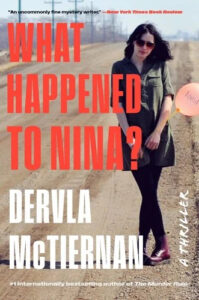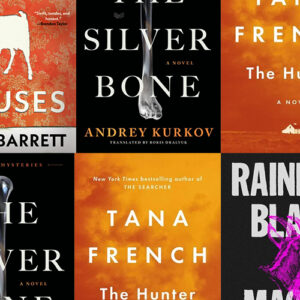I’ve long wanted to write a story where I take something that is considered a universal positive—the love of a parent for their child—and super-charge it and challenge it to the point where that love becomes dangerous. In my experience, we will do things to protect the ones we would love that we would never do, that we could never justify doing, on our own behalf, and that makes for a powerful starting point for a story.
In my new book, What Happened to Nina?, a lovely young couple go away for the weekend, and only one of them comes home. For me the story was never so much about what happened to the missing Nina, or even so much about whether or not her accused boyfriend, Simon, is responsible for her disappearance … for me the story was always about the parents. I put myself firmly in the shoes ocf Nina’s parents, and asked myself if there was anything I wouldn’t do, any length I wouldn’t go to, to get my daughter back? And just as firmly and completely, I tried to see things from the point of view of Simon’s parents. If my son, whom I believed to the core of my being to be innocent, was accused, what would I do? What lengths would I go to to save him? For What Happened to Nina?, I wanted to put two families in crisis in opposition to each other at the centre of a story, and stand back to see what happened. I had a feeling it might be explosive.
Of course, I’m not the first author to tackle this theme, or similar themes, or to write a thriller from the point of view of the parent of the accused. There’s something about the idea of having a child accused of a terrible crime that is, I think, universally horrifying and terribly compelling. Something about the slow peeling back of layers of truth, the fear that maybe we don’t know our child as well as we think we do, the fear of what we might discover next.
I’d like to recommend the following four books that explore this theme, all very different, all equally captivating for their own reasons.

Run Away, Harlan Coben
In Harlan Coben’s Run Away, Simon Greene is a father who has lost his beloved daughter, Paige, to a drug addiction and an abusive boyfriend. Simon and his wife have tried to help Paige through multiple failed rehab attempts, and after one bad experience too many, Simon’s wife decides that enough is enough. She makes Simon promise to stop trying, to let Paige go. Simon makes the promise, but secretly he can’t do it. When Paige disappears again, he keeps searching for her and when her reappearance drags him down a dark and violent path, he can’t seem to stop himself from putting one foot in front of the other, no matter where it takes him.
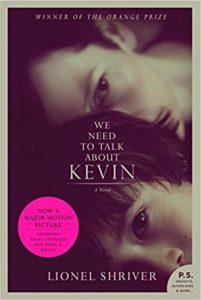
We Need to Talk About Kevin, Lionel Shriver
It’s easy to look back on a book like Kevin, a book that has become part of the canon, and assume it was an immediate success. In fact, Lionel Shriver’s then agent was so dismayed by the novel’s unrelenting darkness, and by the unsympathetic point of view of the protagonist, Eva (a woman who had never bonded with her son, who didn’t even like him) that she thought it was unpublishable. The book was ultimately picked up by a small publishing house, and it grew to the behemoth it become through snow-balling word of mouth. I have some sympathy with the agent who couldn’t see the book for what it was—something brave and powerful and challenging and important—because hindsight is twenty-twenty, and to read We Need to Talk About Kevin for the first time is to discover something ugly and unsettling. Kevin is an unapologetic mass murderer. Eva is the mother who never loved him, but who, now that it is all done, can’t seem to leave him alone. The question that recurs again and again throughout the book is whether Kevin is the product of nature, or nurture. Was he born the way he is, and is that why Eva couldn’t love him, or did he turn out the way he is because she couldn’t bond with him? This book does not offer any easy answers, but it does leave us with a lot to think about.
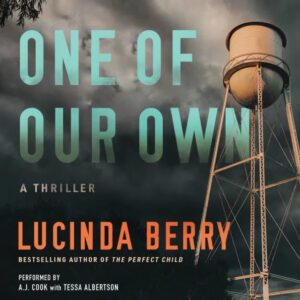
One of Our Own, Lucinda Berry
And now for something a little bit different. This one is an audio original, a novella that comes in at a tight four hours and is all the sweeter for it. Felicia is an attorney and a single mom who also volunteers for a domestic violence helpline. She takes a call from a high school student, a young girl who has been sexually assaulted at a party and who is now planning to take her own revenge. Felicia is at first motivated only to help the girl, but she becomes concerned (reasonably) about the revenge plans, in particular as her son attends the same high school. As the story progresses, we learn, alongside Felicia, that her son was at the party where the assault took place. The question for Felicia, and for all of us, is where or not he was involved, and if he was, what Felicia is going to do about it.
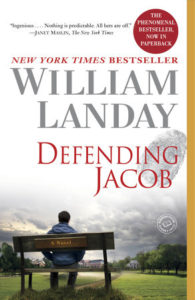
Defending Jacob, William Landay
Defending Jacob was first published in 2012, but the TV adaption starring Chris Evans, which was widely praised and released in 2020, brought fresh eyes to the novel. The protagonist in this case is Andrew Barber, a well-regarded District Attorney, who takes on the case of a murdered teenage boy. He loses the case almost as quickly as he took it, when it transpires that Andrew’s son Jacob’s fingerprint has been found on the body of the dead boy. Jacob explains the fingerprint by saying that he found the body but ran away and told no-one, because he was afraid that he’d be blamed for the boy’s death. Other than that statement, Jacob is largely uncommunicative, leaving his parents to try to piece together the truth of his life, and to marry those truths with the boy they thought they knew. This book is a whodunnit, but it’s also an examination of trauma, of the lies we tell ourselves, and of what happens to a family when those lies are exposed.
***


